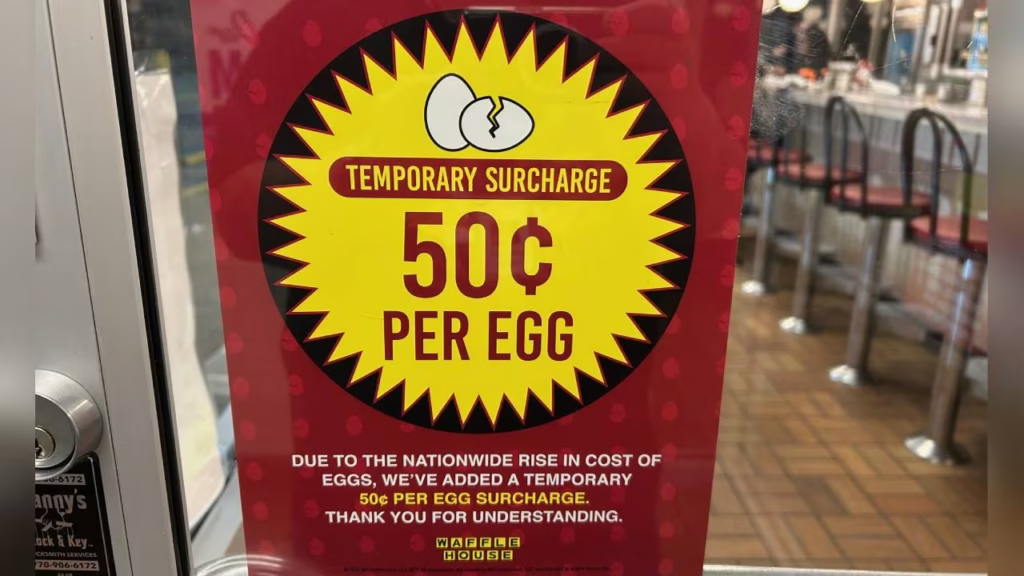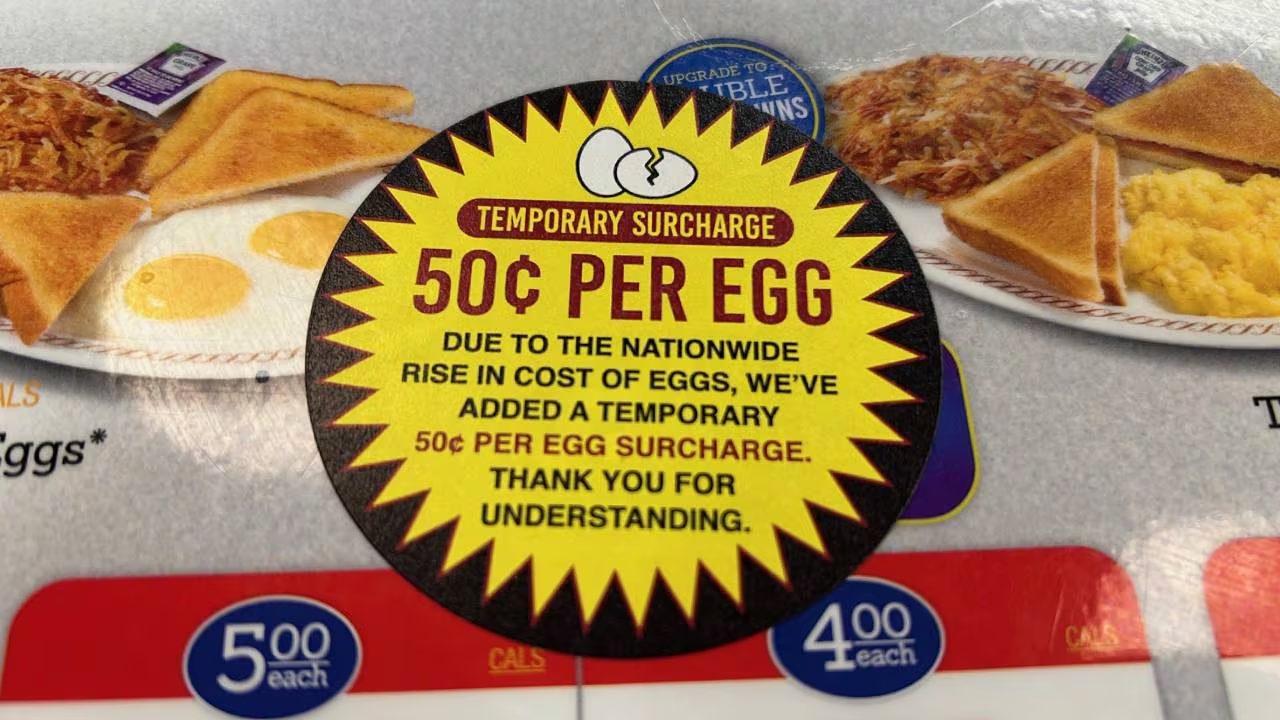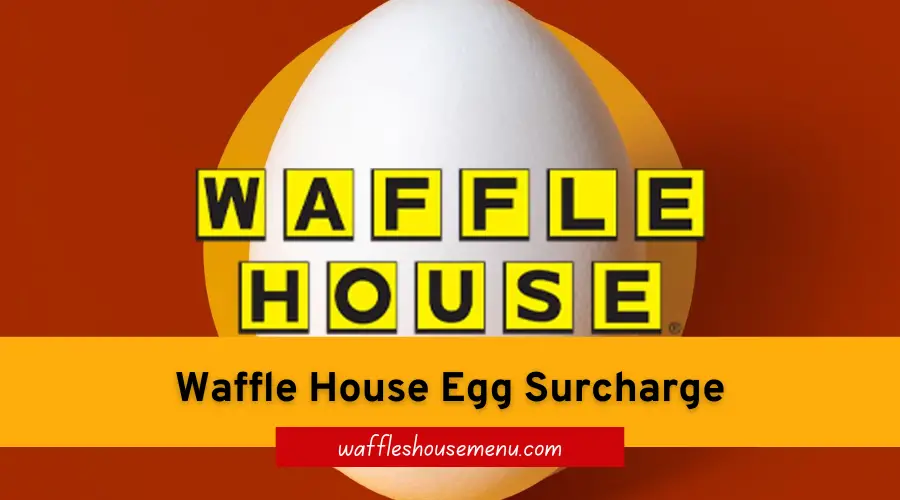Waffle House Egg Surcharge: Extra 50¢ Per Egg in 2025
Waffle House just made a big change—you’ll now pay 50 cents more for every egg in your meal! Why? A massive bird flu outbreak has wiped out millions of chickens, causing an egg shortage and higher prices everywhere. Instead of raising prices on everything, Waffle House is only charging extra for eggs to keep the rest of the menu affordable. But how long will this last? And could breakfast get even more expensive? Here’s what you need to know!

Key Takeaways
- Waffle House has added a 50-cent surcharge per egg to offset soaring costs tied to a nationwide egg shortage caused by the bird flu.
- Egg prices have doubled since early 2024, with the USDA predicting a 20% price hike in 2025.
- The surcharge is temporary and applies only to eggs, avoiding broader menu price increases.
- Over 153 million poultry birds have been culled since 2022, worsening supply chain disruptions.
- Waffle House serves 272 million eggs annually, making this surcharge critical to its operations.
Why Did Waffle House Add a 50-Cent Egg Surcharge?

1. The Bird Flu Crisis: A Nationwide Egg Shortage
The Highly Pathogenic Avian Influenza (HPAI), commonly called bird flu, has devastated U.S. poultry farms since 2022. Outbreaks have led to the culling of 153 million chickens and turkeys to contain the virus, including 17 million egg-laying hens in late 2024 alone. This has slashed egg production, creating a supply-demand imbalance.
Impact on Egg Prices
- December 2024: A dozen eggs averaged $4.15, up from $2.52 in January 2024.
- 2025 Forecast: The USDA predicts egg prices will rise 20.3% this year due to prolonged shortages.
For Waffle House, which uses 272 million eggs yearly, this translates to millions in added costs. The chain opted for a per-egg surcharge instead of raising prices for all items, aiming to balance affordability for customers.
2. How the Surcharge Works
- Effective Date: February 3, 2025.
- Cost Impact: A two-egg breakfast now costs extra (e.g., $7.75 meal → $8.75).
- Temporary Measure: The surcharge will remain until egg prices stabilize.
Waffle House clarified that the fee is not a profit-driven move but a direct response to supplier price hikes. The company stated, “We are continuously monitoring egg prices and will adjust or remove the surcharge as market conditions allow.”
The Ripple Effect: Bird Flu’s Impact Beyond Breakfast
1. Grocery Stores & Consumer Limits
Retailers like Whole Foods, Publix, and Lidl have imposed purchase limits (e.g., 2 cartons per customer) to manage scarcity. Theft has also surged, with a $40,000 egg heist reported in Pennsylvania.
2. Human Health Risks
While rare, 67 human bird flu cases (and one death) have been reported in the U.S. since 2024. The CDC warns against contact with sick birds but notes the public health risk remains low.
3. Political & Economic Fallout
Egg prices became a 2024 election issue, with President Trump pledging to lower grocery costs. Critics argue policies like tariffs and immigration crackdowns could worsen inflation.
Waffle House’s Strategy: Balancing Costs & Customer Loyalty
Why Target Eggs?
Eggs are Waffle House’s #1 menu item, outselling hash browns (153 million) and waffles (124 million). A broad price hike could alienate its budget-conscious clientele, so a targeted surcharge minimizes backlash.
Customer Reactions
While some diners criticize the fee, others acknowledge the chain’s transparency. Notices are posted in restaurants, and the company emphasizes its commitment to “fresh-cracked, Grade A eggs” despite shortages.
FAQ
1. Will the Surcharge End Soon?
Waffle House cannot predict a timeline but vows to remove the fee once egg prices normalize. Experts warn shortages may last 6–12 months as farms rebuild flocks.
2. Are Other Restaurants Following Suit?
Yes. The National Restaurant Association notes breakfast chains are “exploring surcharges or menu changes” to manage costs.
3. Can Bird Flu Spread to Humans?
Risk is low, but the CDC advises avoiding raw eggs and sick animals. Most U.S. cases involved poultry workers.
4. How Can I Save on Eggs?
- Buy frozen or powdered eggs.
- Opt for egg-free breakfasts (e.g., pancakes).
- Check for retailer discounts or loyalty programs.
The Future of Egg Prices & Supply
Industry Outlook
- Farm Recovery: Replenishing flocks takes 26 weeks per hen, delaying supply recovery.
- Virus Mutations: Scientists worry new strains (e.g., H5N9) could worsen outbreaks.
Long-Term Solutions
- Vaccines: Poultry vaccines are in trials but face regulatory hurdles.
- Biosecurity: Farms are tightening protocols to prevent future outbreaks.
Conclusion: A Temporary Challenge With Lasting Lessons
Waffle House’s egg surcharge underscores the fragility of food supply chains amid crises like bird flu. While frustrating for diners, the move reflects a pragmatic approach to sustaining operations without sacrificing quality. As the industry adapts, consumers can expect volatile egg prices through 2025—but hope remains for a rebound.
